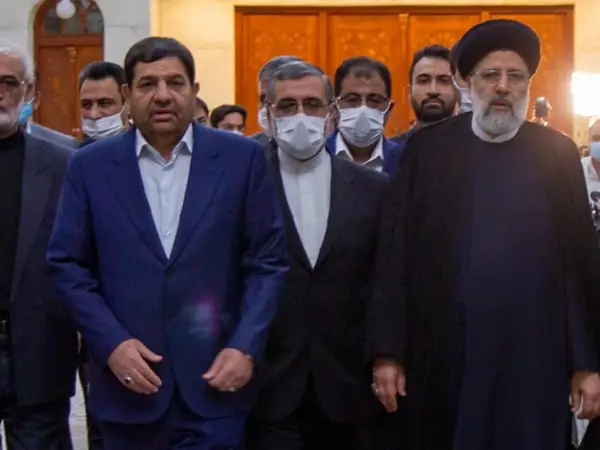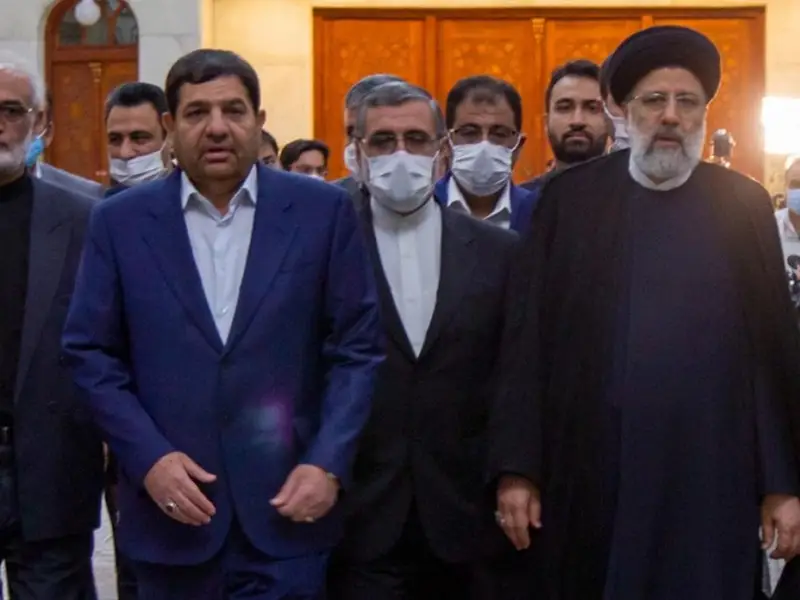More than two months after his inauguration as Iran's new hardline President, Ebrahim Raisi (Raeesi) has completed the setup of his key economic team.
He appointed Ali Salehabadi as the Governor of the Central Bank of Iran, Majid Eshghi as the Chairman of the Stock Exchange and Davoud Manzour as the Taxation Department Chief in mid-October.
The official news agency said in an October 15 report that the make-up is not yet complete as there are still some vacant positions in the team, although these are not key positions.
Most of Raisi’s economic officials are either former military background or are functionaries of various types, none with high state-level or private sector economic experience.
Mohammad Mokhber, a key member of Supreme Leader Ali Khamenei's financial trust is First Vice President. His main job is to coordinate matters among various cabinet ministers. MassoudMirkazemi, an aide to former President Mahmoud Ahmadinejad, is the head of the Planning and Budget Organization. Farhad Rahbar, a former economic official at the Intelligence Ministry is Raisi’s assistant for economic affairs, and former IRGC commander Mohsen Rezaei is Vice President for Economic Affairs.
Rezaei recently issued a long directive to all economic officials and cabinet ministers which turned out to be nothing more than suggesting selling oil for food and other staples as a way of circumventing US sanctions, which could work only if Iran's possible trade partners risk being subjected to secondary sanctions.
Apart from Rezaei who has never been holding a position even remotely linked to economic affairs, the other members of President Raisi's economic team come mainly from Khamenei's office and his financial trust or from the administration of the holy shrine in Mashhad, where they worked with Raisi when he was the superintendent for about two years. Otherwise, none has had any executive experience in the government where they have to be more or less accountable for their performance.
Raisi’s officials are not used to checks and balances and the relative transparency of the government operations in comparison to non-accountable financial institutions that work parallel and sometimes totally separate from the government, do not pay taxes, and their operations are not scrutinized by the parliament and the State Auditing Organization.
These characteristics are also shared by Raisi's eight economic cabinet ministers, including Industries, Mining and Trade Minister Reza Fatemi Amin whose biggest job previously was the investment manager of the holy shrine's administration.
The highlight in the career of Labor Minister Hojjatollah Abdolmaleki is working at the Office of the Imam Khomeini Relief Committee, a pseudo-charity that operates under the aegis of Khamenei's office and runs various businesses that do not have anything to do with relief work or Khomeini.
Oil Minister Javad Owji's former job as deputy oil minister is not the only activity he is known for. The stories in the press in the 2010s alleged that he was trading oil for gold to help circumvent the sanctions. Road and Urban Planning Rostam Ghasemi was also involved and at one point was called to court for investigations regarding illicit oil trade under Ahmadinejad. On the other hand, Ahmadinejad's Industry and Trade Minister Ali Akbar Mehrabian who was found guilty of piracy and violating an innovator's patent rights is now Raisi's Energy Minister.
Very little is known in the public domain about the track record of Communication and ITC Minister Isa Zarepour and Agriculture Minister Javad Sadatinejad.
Ehsan Khandouzi, who is the Minister of Economy, has very little chance to do any serious work under the conflicting influences of Mokhber and Rezaei. Khandouzi and Mirkazemi are the two key officials who need to tackle the long-standing problems of high inflation, low employment and a more than 50 percent budget deficit, not to mention the problem of a battered currency.
In the meantime, Mirkazemi is also tasked with correcting the country's budgeting system which means depriving powerful religious institutions of hefty budgets they get for doing nothing for the economy. Doing so will turn some of Raisi's supporters into critics.
The Keyword for any success for Raisi's economic team is "coordination". A task difficult to accomplish partly because of the differences among Raisi's top officials and partly because of sudden ad-hoc orders issued by Raisi himself, without consulting anyone when he faces serious issues.

